Zouaves. New and unusual military units in France
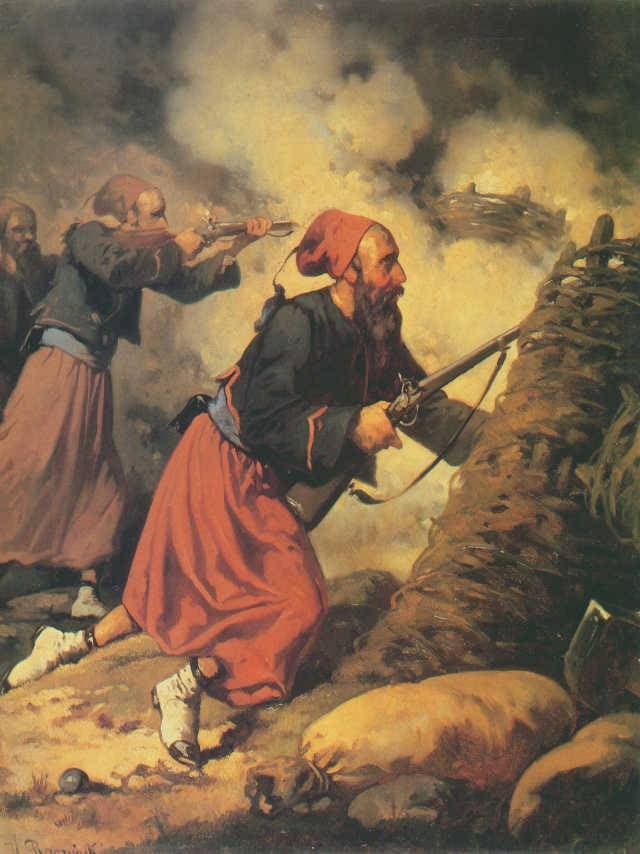
The conquest of Algeria in 1830, as well as the later annexation of Tunisia and Morocco, led to the emergence in France of new and unusual military formations. The most famous of them, of course, are the zouaves. However, there were other exotic military units in the French army: tyrallers, spagi, and gumiers. And on March 9, 1831, King Louis-Philippe signed a decree on the formation of the famous Foreign Legion, whose units are still part of the French army. In this article, we will talk specifically about the zouaves, in the subsequent we will talk about the rest.
First zouaves
As we recall from the article The defeat of the pirate states of the MaghrebOn July 5, 1830, the last dei of Algeria Hussein Pasha surrendered to the French army besieging his capital and left the country.
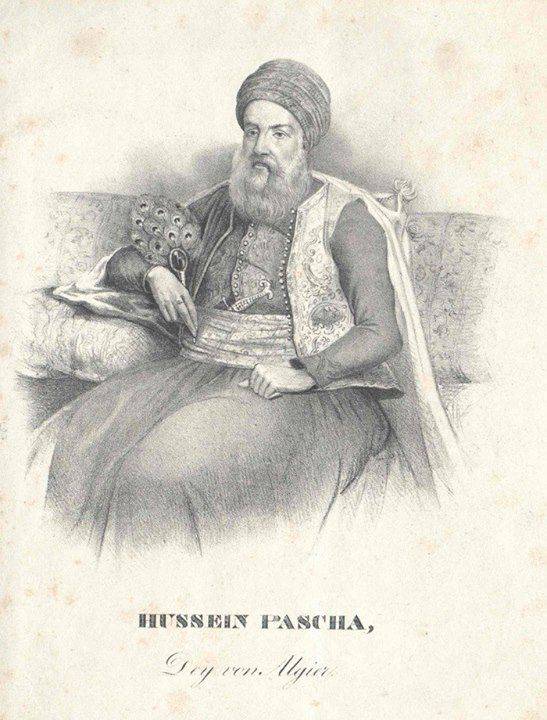
A little more than a month later (August 15, 1830) 500 mercenaries went over to the French - zwawa from the Berber tribe of the Kabil, who served Hussein for money and did not see anything wrong with the fact that now they will be paid not by faithful Muslims, but by the Giaurs-Franks . According to one version, it was the name of this tribe that gave the name to the new military formations.
According to another, less likely version, the name “zuava” originates from the local cloisters of Sufi dervishes, whose influence in the Maghreb at that time was very great.
The French took Kabil with joy, since the territory of Algeria was huge and there was not enough troops for full control over cities and ports. These first "soldiers of fortune" were soon joined by others. By the beginning of the fall of 1830, two battalions of Zouaves of 700 people were formed.
Nevertheless, the French military command completely did not trust them and therefore decided to add ethnic French to the “natives”, making the Zouave formations mixed. In 1833, the first two Zouave battalions were disbanded, and a mixed battalion was created in their place. In addition to Arabs and Berbers, it included Algerian Jews, volunteers from the Metropolis and the French, who decided to move to Algeria (the Arabs called them “black-legged” - the color of the boots they wore, they also began to call them in France).
A little distracted, we still note that later migrants from other European countries: Spain, Italy, Portugal, Switzerland, Belgium, Malta, were also referred to as “black-footed”. All of them, over time, became French and did not separate themselves from immigrants from France. Moreover, among the "black-footed" there were a certain number of Russians. The first were servicemen of the Russian Expeditionary Force, who after the revolution refused to join the Foreign Legion and were expelled to North Africa. Most of them returned to Russia in 1920, but some remained in Algeria. There was also a second wave: in 1922, ships with White Guards evacuated from Crimea arrived in Bizerte (Tunisia). Some of them also settled in Tunisia and Algeria.
Back to the zouaves. In 1835, the second mixed battalion was formed, in 1837 the third.
How zouaves became French
However, the mentality of the Berbers and the French was too different (not to mention the practice of different religions by them), so in 1841 the Zuav formations became completely French. Arabs and Berbers who served in Zuava formations were transferred to the new military units of the “Algerian riflemen” (tyraliers; they will be discussed later).
How did the French get into the zouaves? As well as in other military units. There were two ways: either the 20-year-old young man was unlucky at the draw, and he went to the army for 7 years. Or he went to serve as a volunteer - for two years.
However, young men from wealthy and prosperous families did not want to join the army and, as a rule, put in their place a “deputy” - a man who went to serve for them for a fee. In the Zouave battalions, “substitutes” were almost all ordinary soldiers and many corporals. According to contemporaries, these were not the best representatives of the French nation, there were many lumpen and obvious criminals, it is not surprising that the discipline in these first battalions was low, drunkenness was common, and these soldiers did not disdain the robberies of the local population.
F. Engels wrote about the Zouaves:
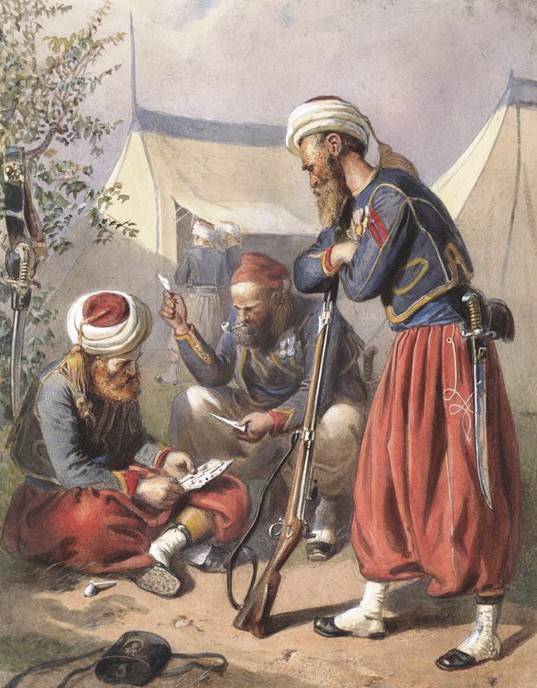
However, over time, the qualitative composition of the zouaves has changed significantly, their units have turned into elite units of the French army. Soldiers of other regiments who wanted to join the Zouave battalion could do this only after two years of immaculate service.
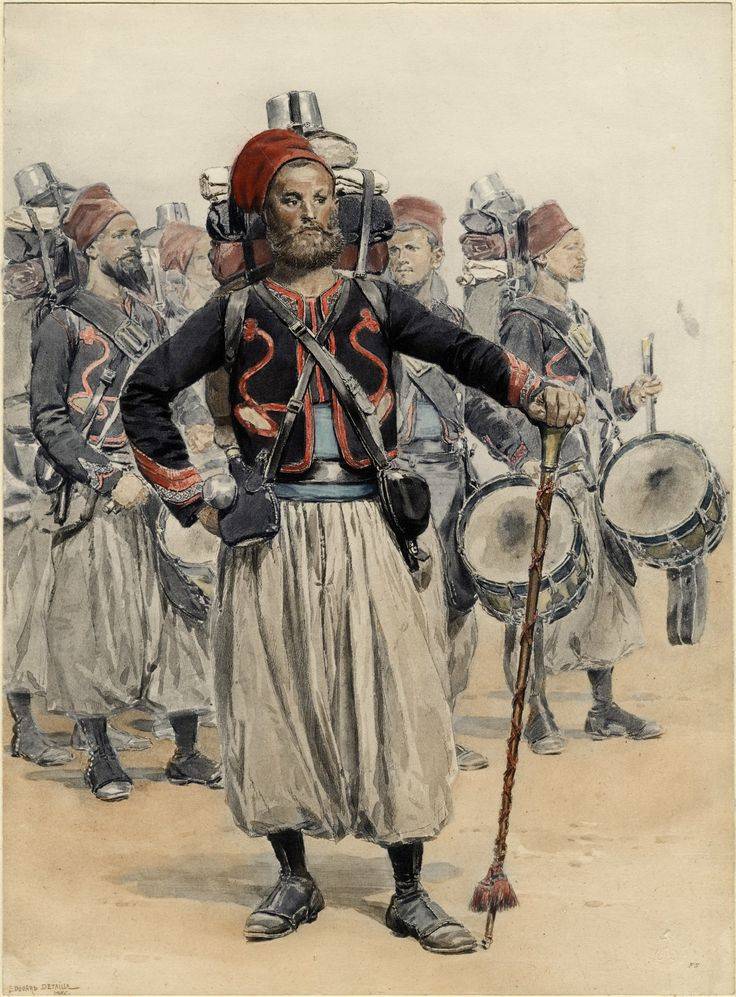
In 1852, in Algeria, there were three regiments of zouaves who stood in the largest cities of this country: in Algeria, Oran and Constantine.
In 1907 there were already four such regiments.
In total, 31 battalions of Zouaves were created, of which 8 were formed in Paris and Lyon.
Vivandiere. “Fighting friends”
In the Zouave formations (as in other French military units) there were women who were called Vivandiere (“Vivandie” - the Marktantes). Among them were cohabitants of soldiers and sergeants, and there were also prostitutes who were also part-time laundresses, cooks, and during the hostilities and nurses. The national composition of Vivandiere was motley: French, Algerian Jewesses, even local natives. In 1818, maritime women in the French army received official status, each of them was given a saber, and sometimes in the most desperate situations they took part in hostilities.
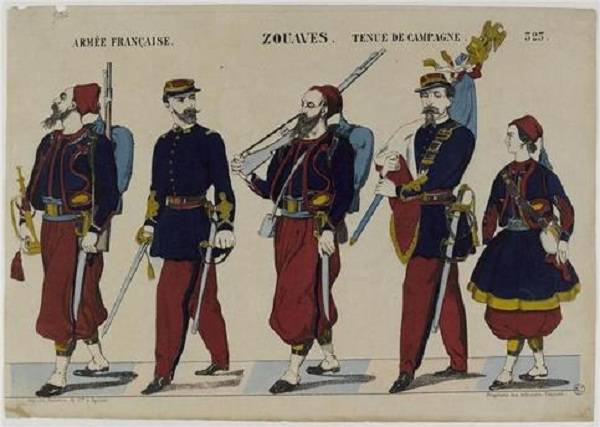
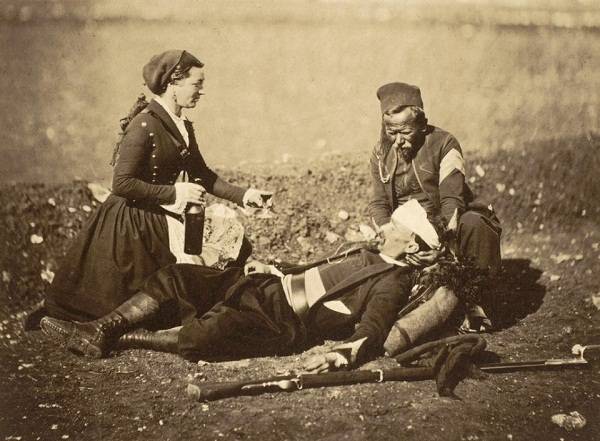
I must say that among the zouaves Vivandiere enjoyed great respect, and even the most “preoccupied” and “frostbitten” males did not risk offending not only the official friends of their colleagues, but also the “orphan” (regimental) marketeers. In relations with them, everything had to be honest and by mutual agreement. In the compounds of the Zouaves, Vivandiere disappeared only shortly before World War II.
Military uniform of zouaves
The zouaves were distinguished by an unusual form, which made them look like Turkish janissaries. Instead of a uniform, they had a short cloth jacket of dark blue color, embroidered with red woolen braid, under which they put on a vest with five buttons. In summer, they wore short white harem pants, in winter - long red, sewn from more of a more dense fabric. They wore leggings on their feet, on which sometimes buttons and boots were sewn as decorations. As a headdress, the zouaves used a red fez with a blue tassel (“sheshiya”), which was sometimes wrapped in green or blue cloth. The fez of officers and sergeants could be distinguished by the golden thread woven into it.
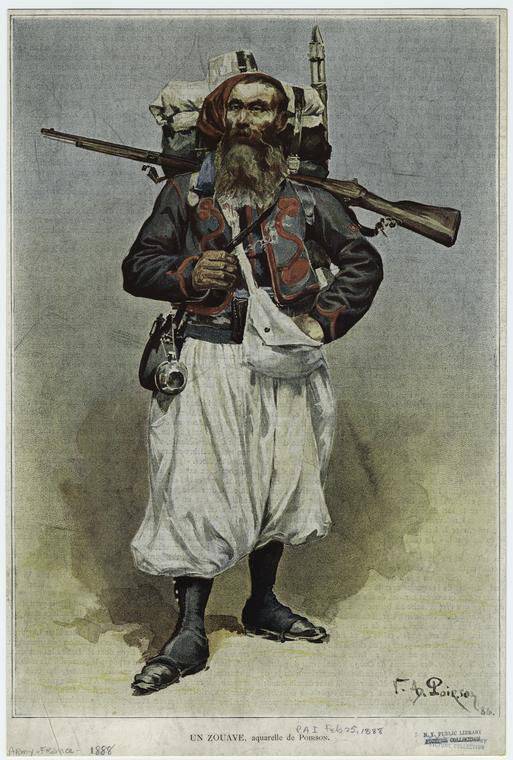
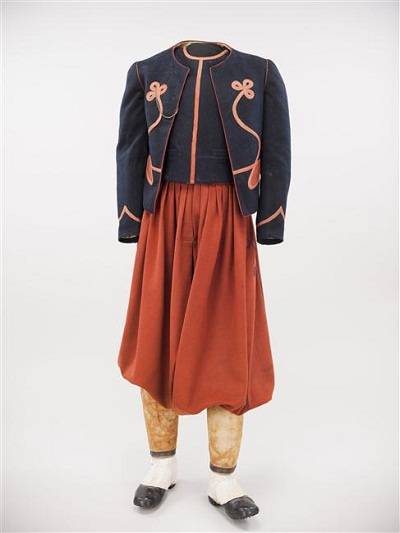
By the way, in the middle of the XNUMXth century, so-called Zuava jackets became fashionable for women, look at one of them:
But we are a little distracted, back to the zouaves. On the right side of the jacket they wore a copper badge - a crescent moon with a star, to which a chain with a needle was attached to clean the seed opening of the musket.
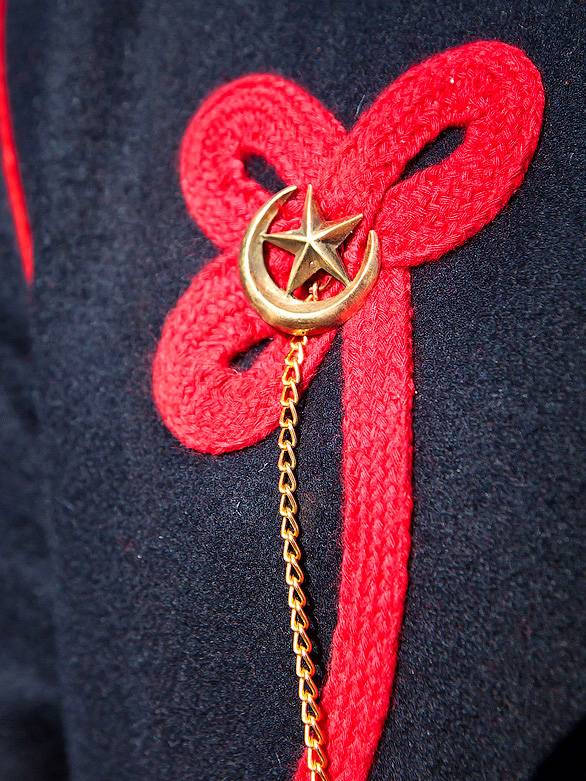
All zouaves wore beards (although the charter did not require this), the length of the beard served as a kind of indicator of years of service.
In 1915, the shape of the zouaves underwent significant changes: they were dressed in mustard or khaki uniforms, as the decals remained fez and a blue wool belt. Then the Zouaves were given metal helmets.
Vivandiere also had its own military uniform: red harem pants, leggings, blue jackets with red lining, blue skirts and red fez with blue tassels.
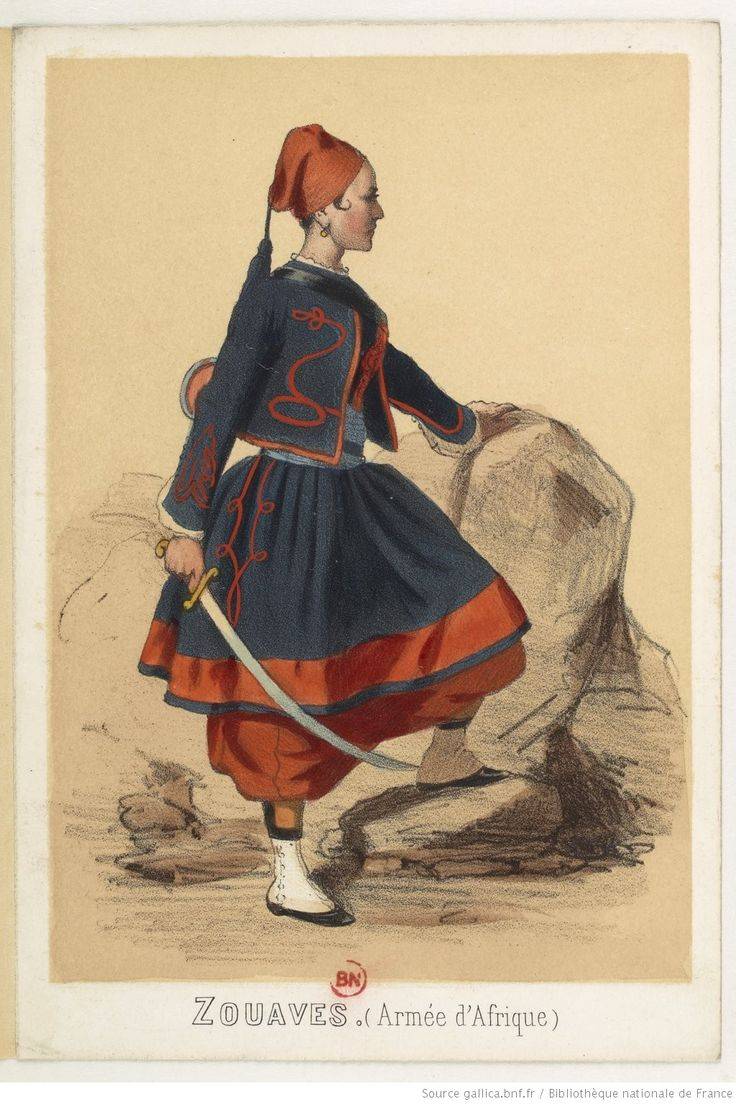
Zouav Battle Path
The first big war for the French zouaves was the famous Crimean (1853-1856).
At that time, their formations were already considered elite and highly combat-ready, but it soon became clear that the Russians were fighting especially hard against them. It turned out that the Russians, dressed in an exotic “eastern” uniform, were mistaken for the Turks, whose military reputation at that time was already extremely low. And the Russians were simply ashamed to retreat before the "Turks".
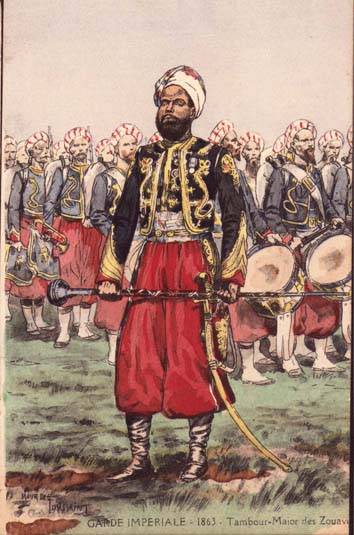
Nevertheless, the zouaves fought skillfully and with dignity. At the Battle of Alma, soldiers of the First Battalion of the Third Zouave Regiment, having climbed steep cliffs, were able to get around the positions of the left flank of the Russian army.
The Malakhov Kurgan was stormed by seven regiments, three of which were Zuavian. Even the body of the French Marshal Saint-Arnaud, who died of cholera, was entrusted with the company of accompanying a Zouave company.
After the Crimean War, Napoleon III ordered the formation of an additional regiment of zouaves, which became part of the imperial guard.
In 1859, the Zouaves fought in Italy against Austrian forces and crushed the uprising in the Kabiliya region (Northern Algeria). During the Italian War, the Second Zouave Regiment, during the Battle of Medzhent, captured the banner of the 9th Austrian Infantry Regiment. For this, he was awarded the Order of the Legion of Honor, and the reigning monarch of the Sardinian kingdom (Piedmont), Victor Emmanuel II, became his honorary corporal.
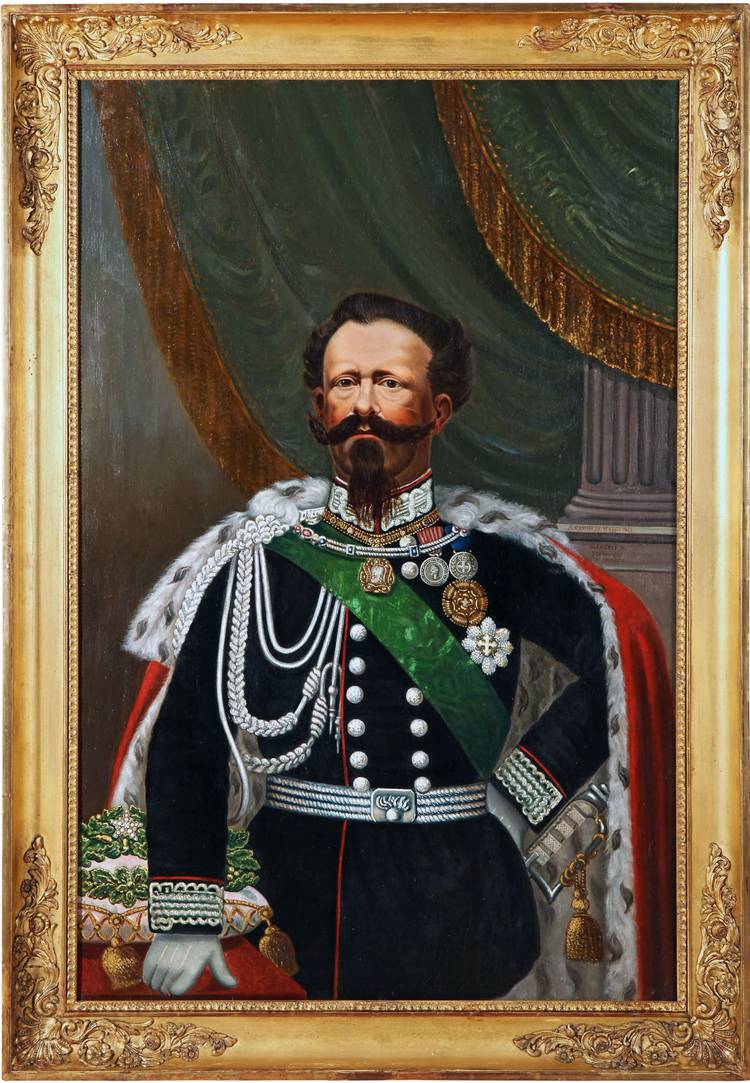
In 1861-1864 The second and third regiments of the Zouaves fought in Mexico, where French troops supported Archduke Maximilian (brother of the Austrian Emperor Franz Joseph): according to the results of that campaign, the Third Regiment was awarded the Order of the Legion of Honor.
And other Zouave formations at the same time fought in Morocco.
In July 1870, the Zouave regiments (including the Guards) took part in the hostilities during the Franco-Prussian War, which ended in France with a heavy defeat and collapse of the monarchy.
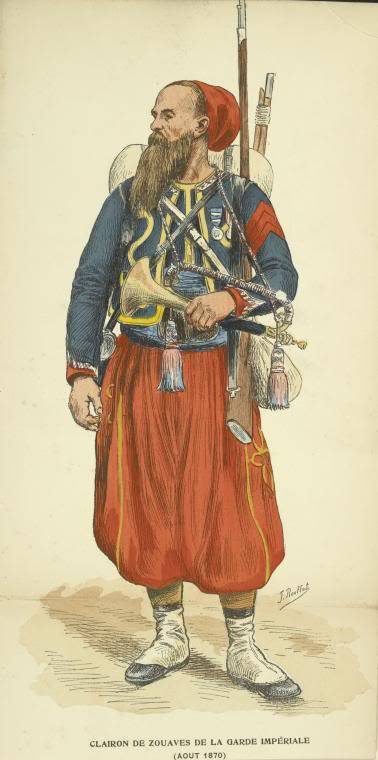
The Zuav guards regiment dismissed the new republican authorities (like all other imperial guards units), but then re-formed, already as an army. When, in 1881, the Bay of Tunisia signed an agreement recognizing the French protectorate, the Fourth Zouave Regiment was stationed in that country.
History Zuavs continued: in 1872 four regiments of Zouavas fought against the rebels in Algeria and Tunisia, in 1880 and in 1890. - "pacified" Morocco. In 1907-1912 Zouave units again participated in hostilities in Morocco, which ended with the signing of the 1912 Fez Treaty with this country (recognition by the Sultan of the French protectorate). At that time, eight battalions of Zouaves were stationed in Morocco.
At the end of the 1884th century, the zouaves also ended up in Vietnam, where the battalion of the Third Regiment was sent. Two other battalions participated in the fighting during the Franco-Chinese War (August 1885 - April 1900). And in 1901-XNUMX. the Zouaves were part of the French contingent during the suppression of the Ichtuan rebellion.
After the outbreak of World War I, in December 1914 and January 1915, in addition to the existing zouave regiments, the Seventh Regiment, the Second Encore and the Third Encore (based on the reserve battalions of the Second and Third Regiments) were formed in Algeria, in Morocco - Eighth and Ninth Regiments.
Several Zouave battalions during the war were formed from Alsatian and Lorraine defectors.
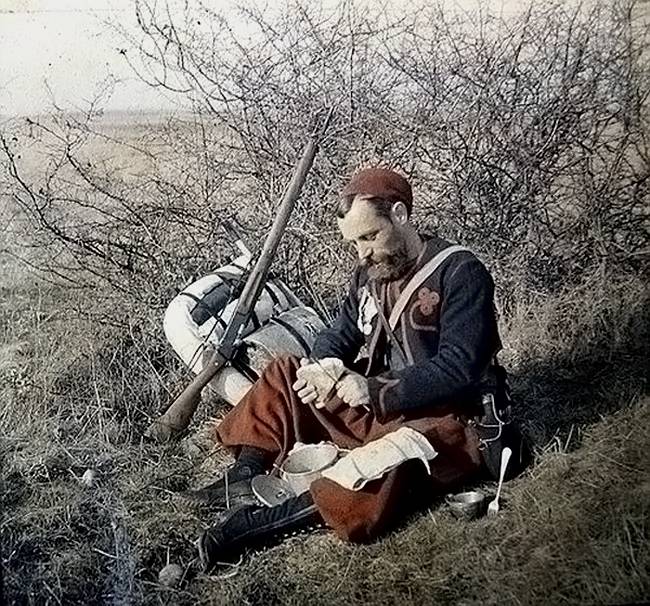
The Zouaves were famous for their desperate courage and earned a reputation as "thugs" - both in the French army and among German soldiers. In the course of hostilities, all the Zouave regiments received the Legion of Honor and the “record on standards”.
The indigenous inhabitants of the Maghreb took part in the First World War - about 170 thousand Arabs and Berbers. Of these, 25 thousand Algerians, 9800 Tunisians and 12 thousand Moroccans died. In addition, up to 140 thousand people from North Africa worked at that time in French factories and farms, thus becoming the first mass labor migrants.
You have probably heard of the “Miracle on the Marne” and the transfer of French troops to combat positions in Parisian taxis (600 cars were involved).
Thus, at first two regiments of the Tunisian zouaves were delivered to the front, and then part of the soldiers of the Moroccan division, which included units of the Zouaves, the Foreign Legion and the Moroccan tyrael (legionnaires and tyiraliers, as well as spag and hummers, will be described in the following articles).
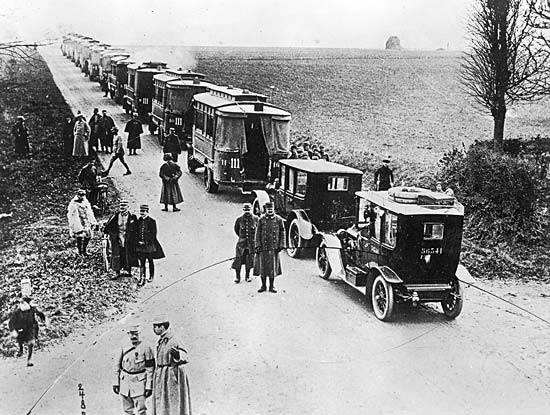
The invaders
In December 1918, the Zouaves (as interventionists) ended up in Odessa and left it only in April 1919. You can guess how they behaved there from a statement made on the very first day after the landing by the commander of the French troops in the east, General Franche d'Espere:
However, representatives of other "enlightened nations" (Serbs, Poles, Greeks, Siregalese tyrals and French tyrants) acted better in Odessa: it is estimated that 4 people were killed in 700 months in a city of 38 by the interventionists , 436 were injured, 16 women were raped, 386 were arrested and subjected to corporal punishment.
Despite such toughness, the intervention authorities showed a complete inability to restore elementary order in the city. It was under them that the “star” of the pretty romanticized I. Babel Moishe-Yankel Meer-Wolfovich Vinnitsky - Mishka Yaponchik (Odessa Tales, in which the Japanese became the prototype of the bandit Beni Crick) ascended.
It came to the point that the bandits of Yaponchik in broad daylight had robbed a Romanian game club (the Romanians occupied Bessarabia, but they preferred to have fun in a more fun Odessa).
In January 1919, the Governor-General of Odessa A.N. Grishin-Almazov said in an interview with the newspaper "Odessa news":
Bear Jap then wrote him an ultimatum letter that said:
The Governor-General dared to refuse this proposal, and the "offended" bandits of Jap attacked his car.
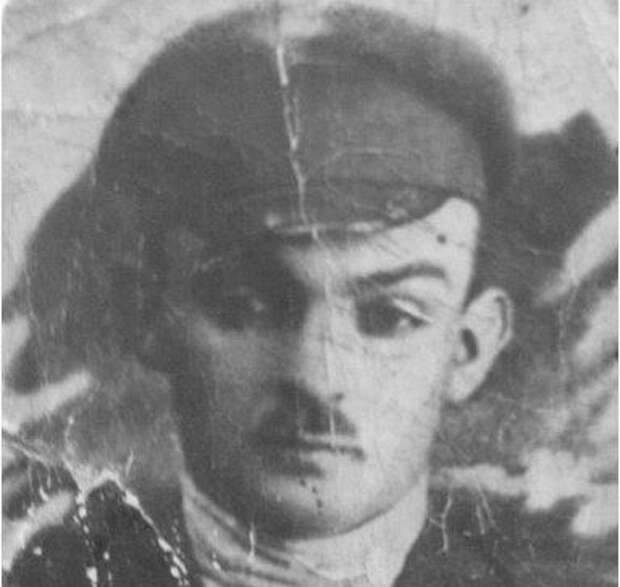
At the same time, Yaponchik himself was, as they say, “clean”, Leonid Utesov, who knew him, spoke of him:
An Cheka employee F. Fomin recalled Odessa after the interventionists:
About Bear Jap, Fomin writes:
You can write a separate article about the far from romantic adventures of this criminal. But we will not be distracted and say only that the KGB quickly managed to stop this “lawlessness”; in July 1919, Yaponchik himself was arrested and shot by the head of the Ascension Combat Station, N. I. Ursulov.
The zouaves also visited Siberia: on August 4, 1918, the Siberian colonial battalion was formed in the Chinese city of Taku, which, along with other parts of the colonial regiments, included the 5th company of the Third Zuav regiment. There is evidence that this battalion took part in the attack on the positions of the Red Army near Ufa. Further in Ufa and Chelyabinsk he carried garrison service, guarded the railway tracks, accompanied the trains. The Siberian adventures of the Zouaves ended on February 14, 1920 - with evacuation from Vladivostok.
Reef War in Morocco
After the end of the First World War, part of the zouaves was demobilized, and in 1920 six Zuava regiments remained in the French army - four “old” and two new (Eighth and Ninth). All of them took part in the so-called Reef War, which, despite the victory at an expensive price, did not bring glory to the Europeans (Spaniards and French).
In 1921, the Confederate Republic of Er-Reef tribes was created in Morocco (Er-Reef is the name of a mountainous region in the north of Morocco), headed by Abd al-Krim al-Khattabi - the son of the leader of the Berber tribe Banu Uriagel.
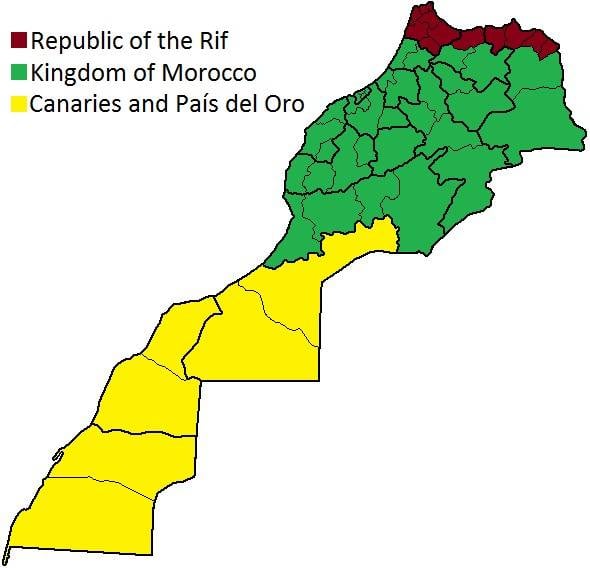
Back in 1919, he began a guerrilla war. In 1920, after the death of his father, he headed the tribe, introduced general conscription for men aged 16 to 50 years, and eventually created a real army, which included artillery units. The rebellion was supported initially by the Beni-tuzin tribe, and then by other Berber tribes (12 in total).
This, of course, could not please the French, who controlled the main part of the country, and the Spaniards, who now owned the northern coast of Morocco with the ports of Ceuta and Melitlia, as well as the Reef Mountains.
The fighting continued until May 27, 1926, when the Moroccans were finally defeated by the Franco-Spanish army (numbering 250 thousand people), led by Marshal Petain. The losses of the Europeans who used against the rebels Tanks, Aviation and chemical weapon, were shocking: the Spanish army lost 18 thousand people killed, died of wounds and missing, the French - about 10 thousand. Moroccan losses were almost three times lower: about 10 thousand people.
From 1927 to 1939, the First and Second Zouaves regiments were in Morocco, the Third, Eighth and Ninth in Algeria, and the Fourth in Tunisia.
Unsuccessful war
After the outbreak of World War II, 9 new Zouave regiments were created: 5 were formed in France, 4 in North Africa. This time they failed to distinguish themselves: during the fighting, these formations suffered heavy losses, many soldiers and officers were captured. But the First, Third, and Fourth Zouaves remaining in Africa after the Allied landings as part of Operation Dragoon fought in Tunisia along with the British and Americans (campaign 1942-1943), nine battalions of Zouaves in 1944-1945. together with the allies fought in France and Germany.
The completion of the history of the French Zouaves
In 1954-1962 the Zouaves again took part in the fighting in Algeria.
It should be said that Algeria was not a colony, but the overseas department of France (its full part), and therefore the life of ordinary Algerians could not be called very difficult and hopeless - their standard of living, of course, was lower than that of the French metropolis and the "black-footed" but much higher than the neighbors. However, the nationalists preferred not to look around. On November 1, 1954, the Algeria National Liberation Front was established. A war broke out in which French troops invariably defeated poorly armed and organized rebels. The French army achieved particularly great successes starting in February 1959: in 1960 it was already possible to talk about the military victory of the French units and the disorganization of the TNF, almost all of whose leaders were arrested or killed. However, this did not help in the least to achieve the loyalty of the local population.
Charles de Gaulle stopped the Algerian war. On June 1, 1958 he was appointed chairman of the Council of Ministers, and on December 21 he was elected president of the French Republic. Ironically, it was with him that the French army achieved the greatest success in the fight against TNF, but the president made a firm decision to leave Algeria. This “surrender” led to an open revolt of the military units stationed in Algeria (April 1961) and to the emergence in 1961 of the SLA (Secret Armed Organization, or Organization of the Secret Army, Organization de l'Armee Secrete), which began the hunt for de Gaulle (according to various sources, from 13 to 15 attempts), and other "traitors".
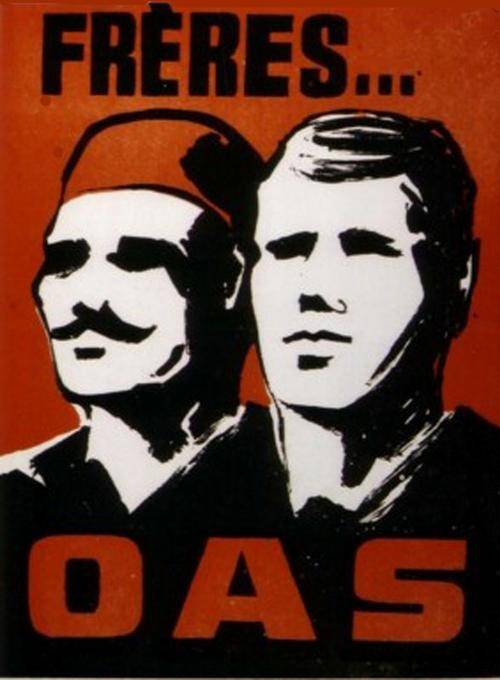
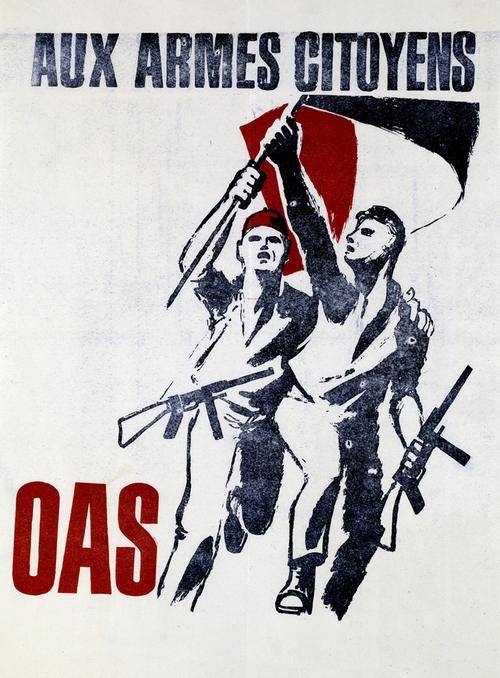
We will talk about these events in an article devoted to the French Foreign Legion, since it was precisely its parts that played a crucial role in decoupling this story, and the most famous and elite regiment of legionaries was disbanded by order of de Gaulle.
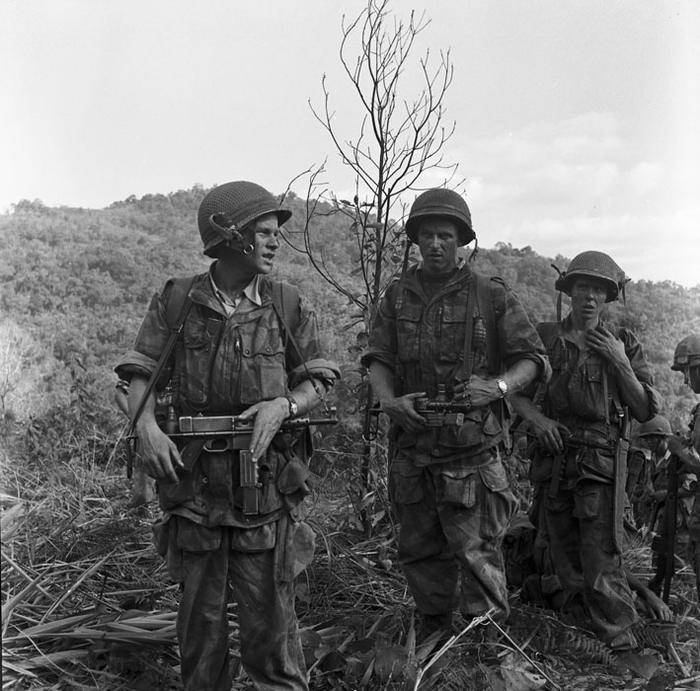
In the meantime, we say that everything ended with the conclusion of the Evian Agreements (March 18, 1962), after which, in referenda held in France and Algeria, the majority of the population spoke in favor of the formation of an independent Algerian state. Algeria's independence was officially proclaimed on July 5, 1962.
And then the long history of the Zouaves of the French army came to an end, the combat units of which were disbanded. Only in the French commando military school until 2006 were flags and uniforms of the Zouaves still used.
It should be said that the French zouaves were very popular in other countries where attempts were made to organize their military formations according to their model. We will talk about them in a separate article. In the following articles, we will talk about the purely Maghreb formations of the French army: tyralers, spag and gumery.
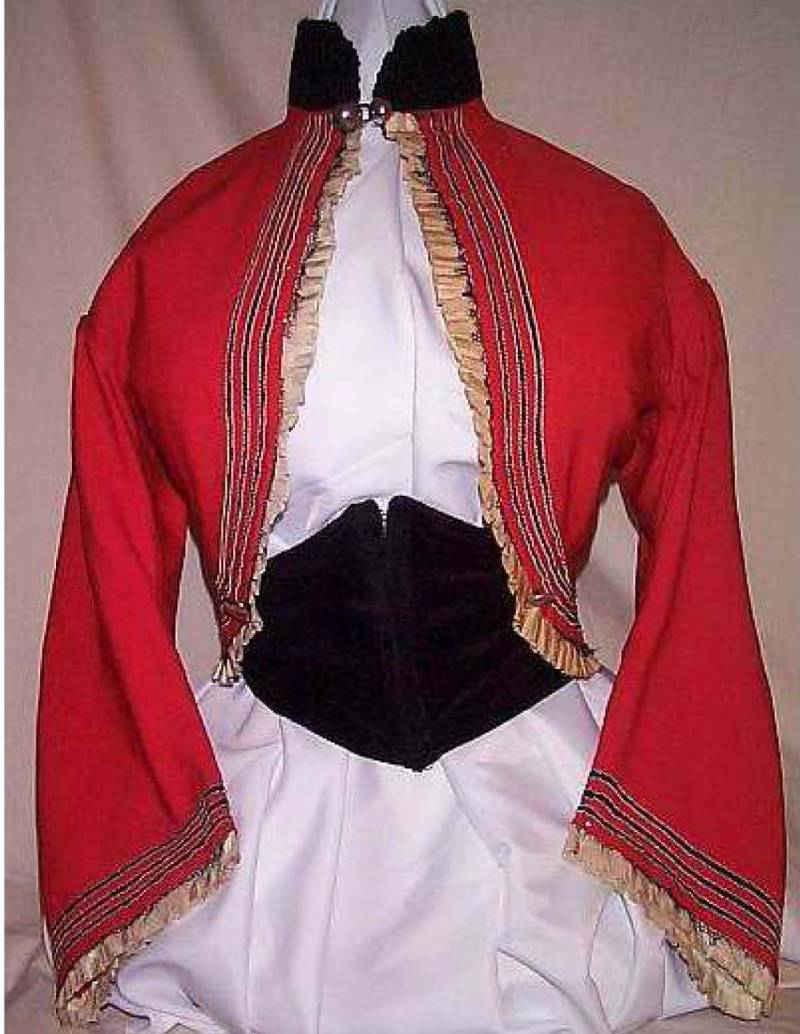
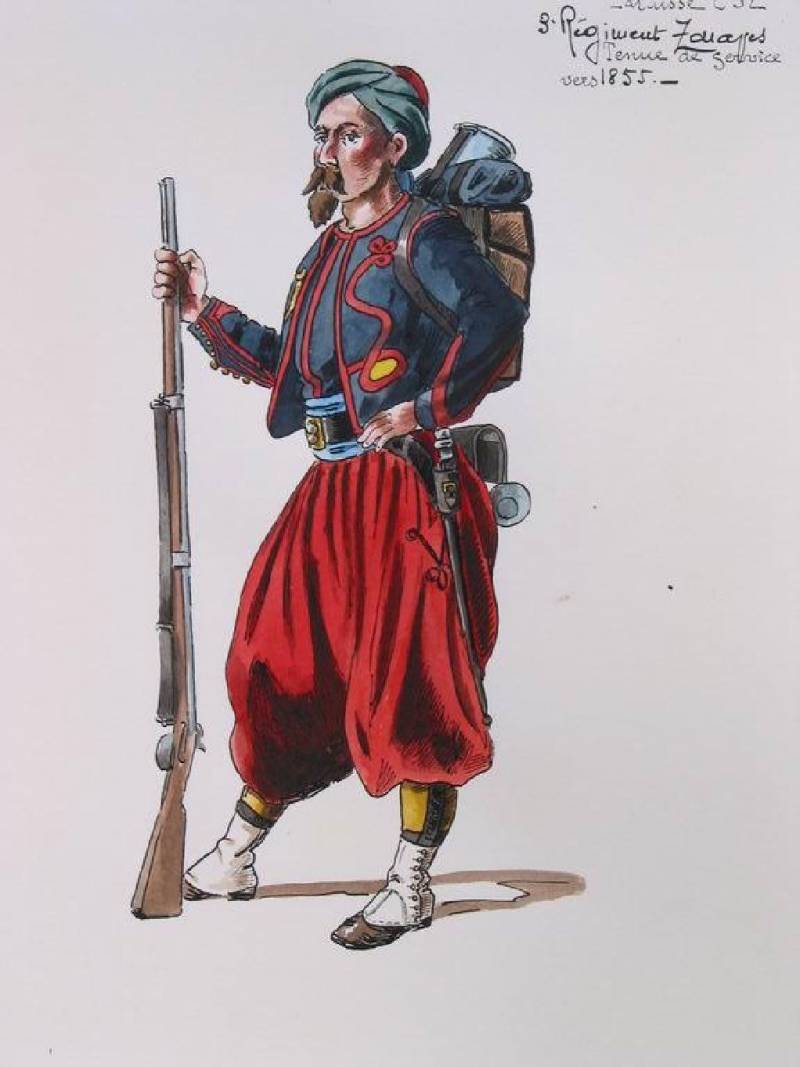
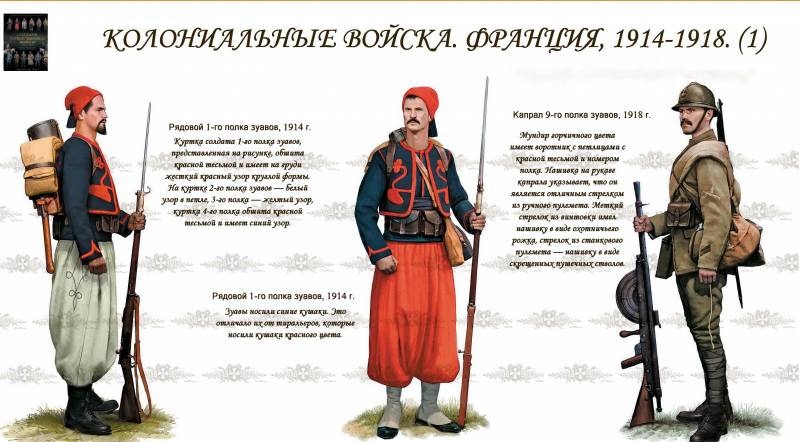
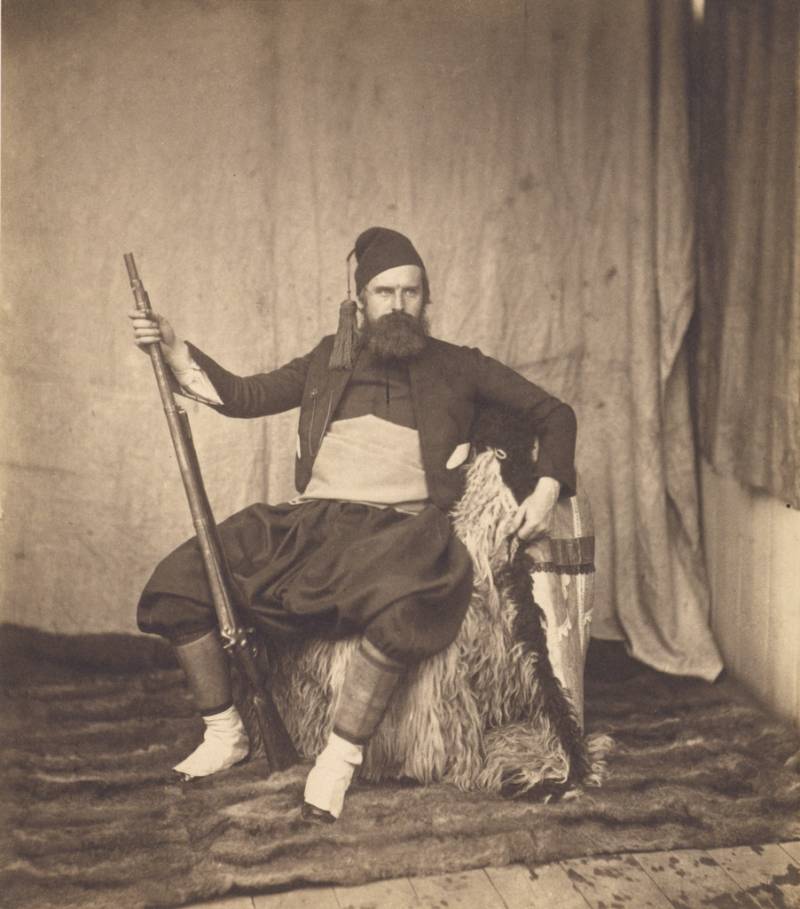
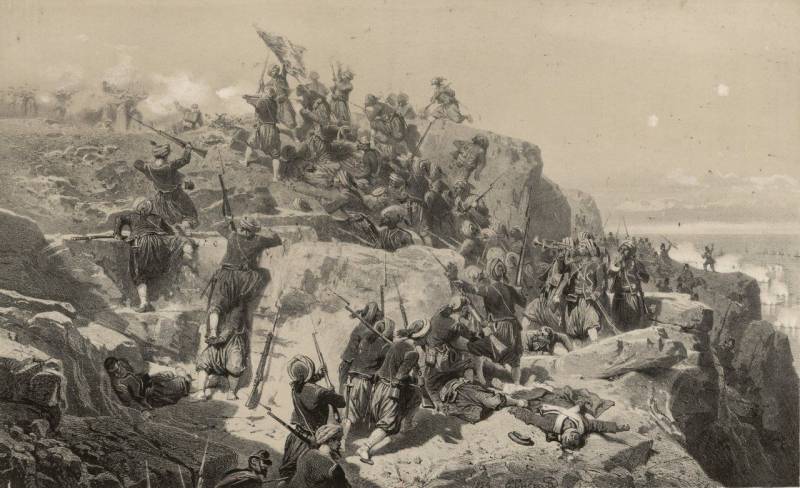
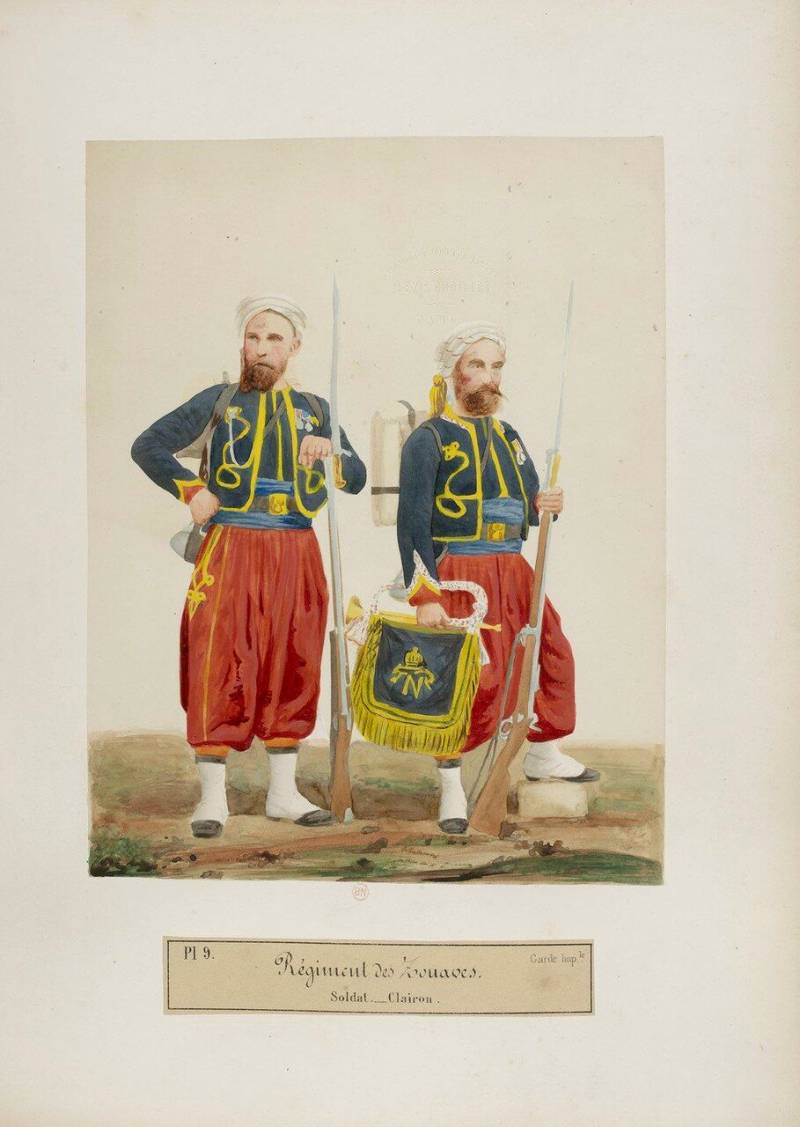
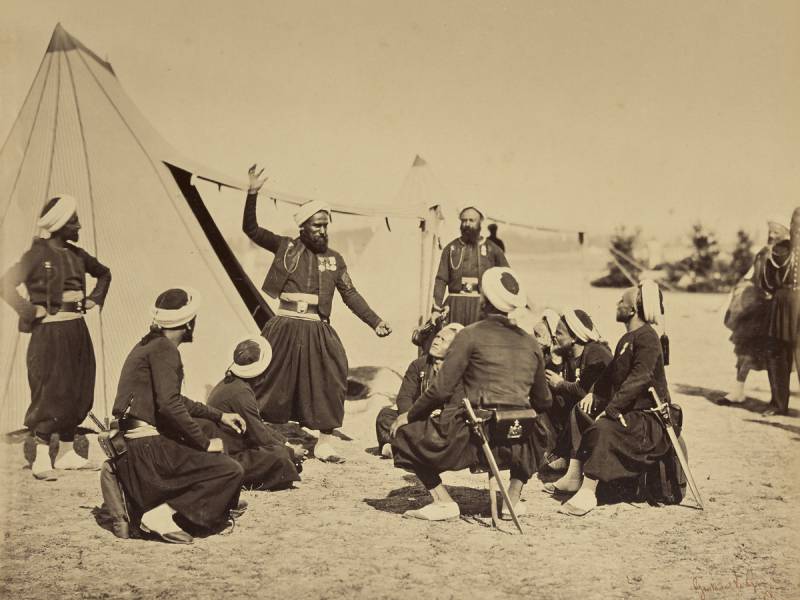
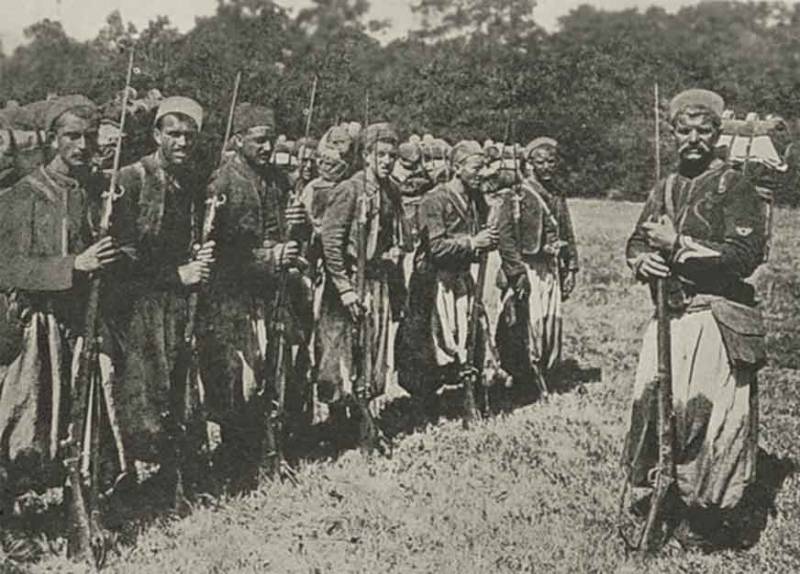
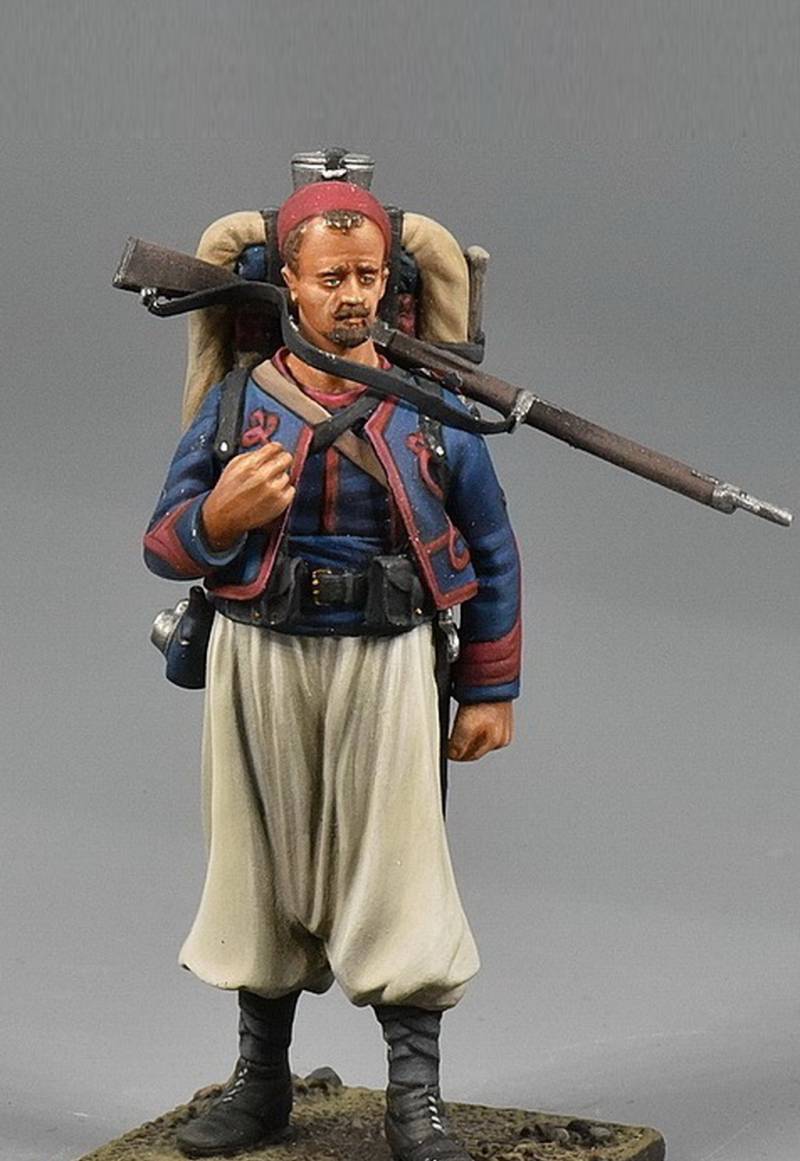
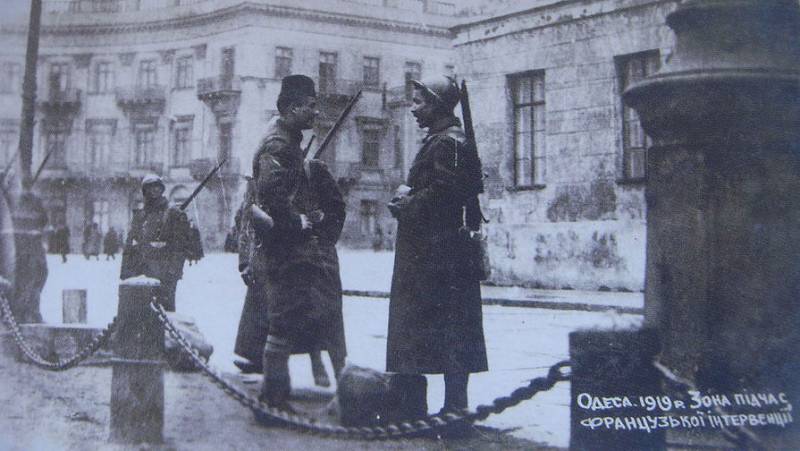
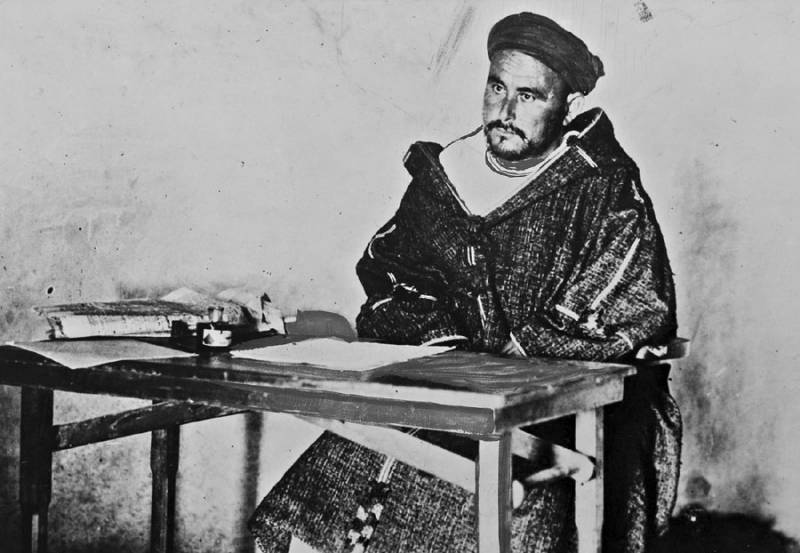
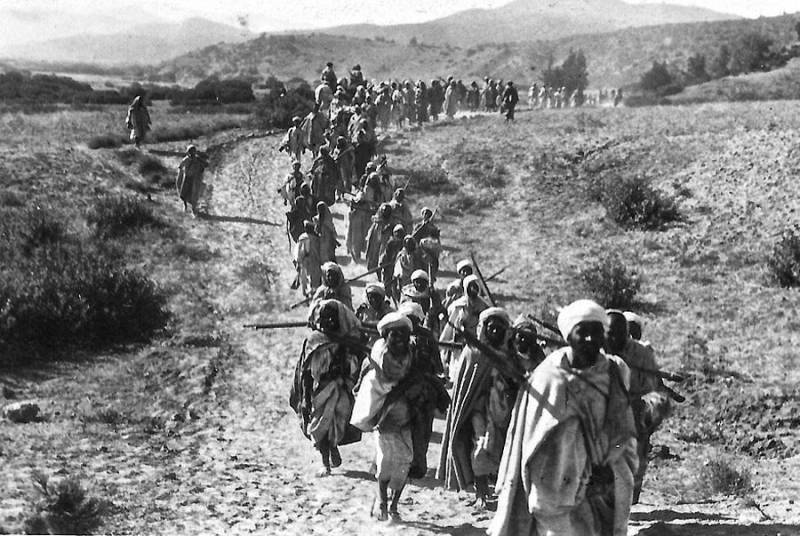
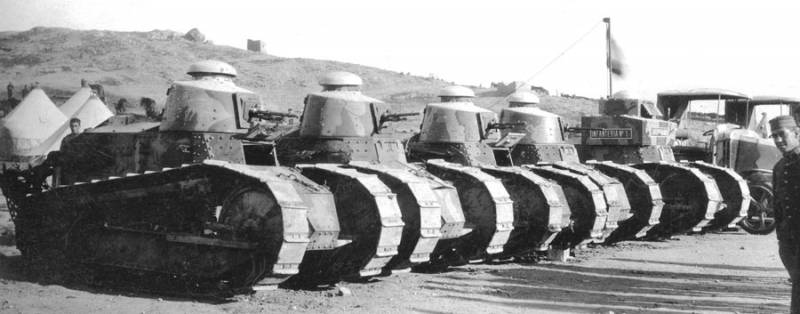
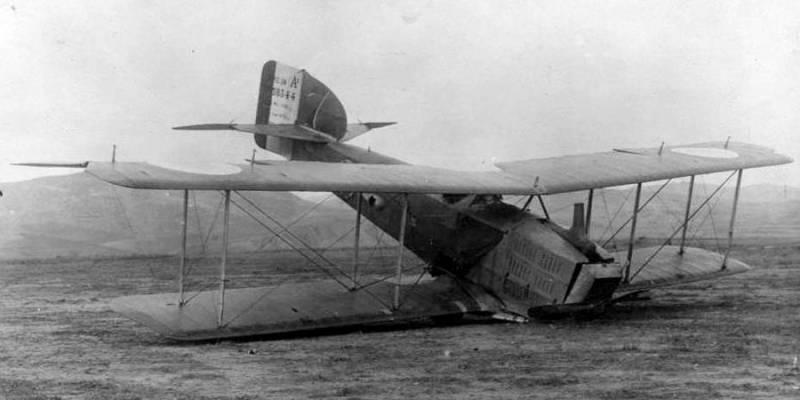
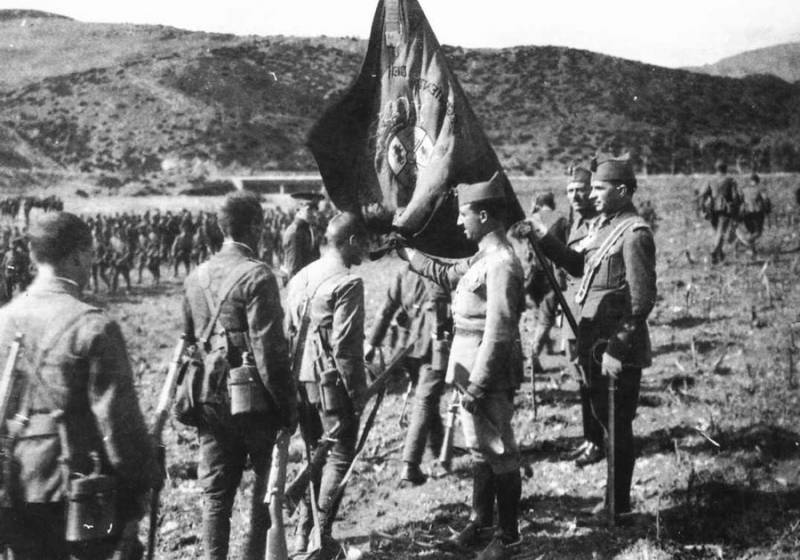
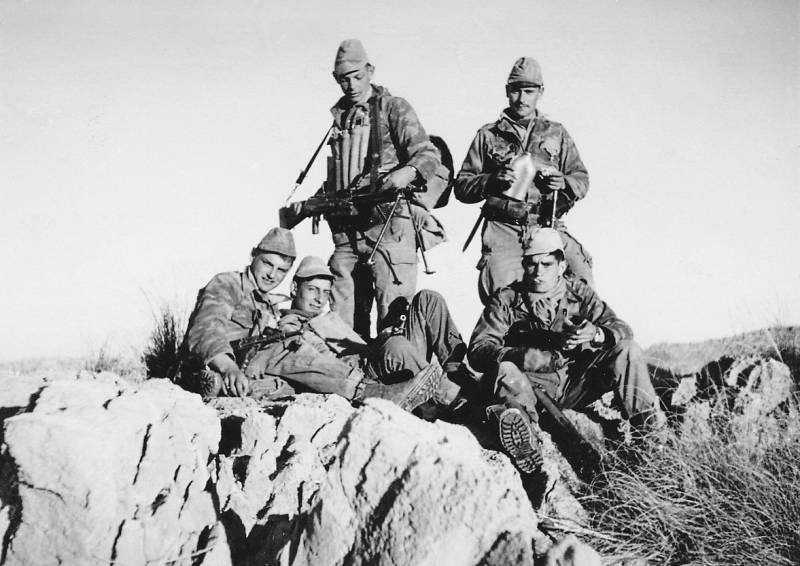
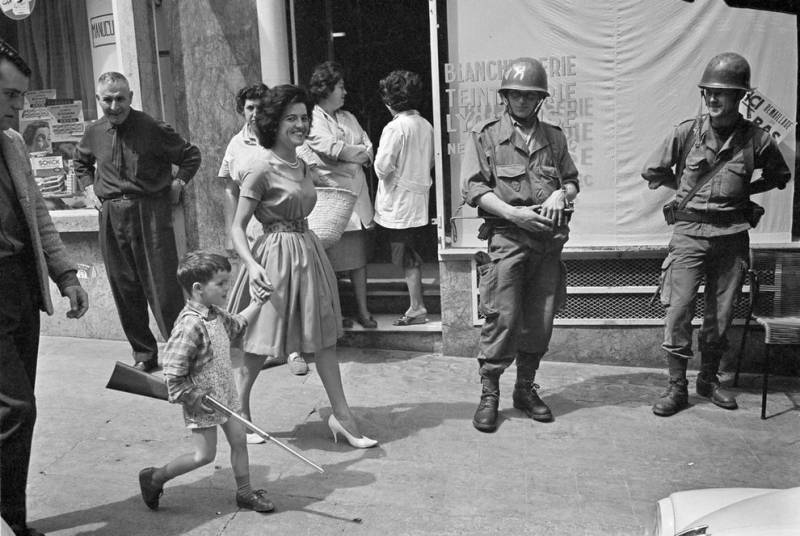
Information